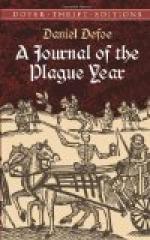What are the exact terms Defoe made with the ministry, and on exactly what conditions he was released from Newgate, have not been ascertained. It is certain he never ceased to write, even while in prison, both anonymously and under his own name. For some years, in addition to pamphlet after pamphlet, he published a newspaper which he called the “Review,"[1] in which he generally sided with the moderate Whigs, advocated earnestly the union with Scotland, and gave the English people a vast deal of good advice upon foreign policy and domestic trade. There is no doubt that during this time he was in the secret service of the government. When the Tories displaced the Whigs in 1710, he managed to keep his post, and took his “Review” over to the support of the new masters, justifying his turncoating by a disingenuous plea of preferring country to party. His pamphleteering pen was now as active in the service of the Tory prime minister Harley as it had been in that of the Whig Godolphin. The party of the latter rightly regarded him as a traitor to their cause, and secured an order from the Court of Queen’s Bench, directing the attorney-general to prosecute Defoe for certain pamphlets, which they declared were directed against the Hanoverian succession. Before the trial took place, Harley, at whose instigation the pamphlets had been written, secured his henchman a royal pardon.
When the Tories fell from power at the death of Queen Anne (1714), and the Whigs again obtained possession of the government, only one of two courses was open to Defoe: he must either retire permanently from politics, or again change sides. He unhesitatingly chose the latter. But his political reputation had now sunk so low, that no party could afford the disgrace of his open support. He was accordingly employed as a literary and political spy, ostensibly opposing the government, worming himself into the confidence of Tory editors and politicians, using his influence as an editorial writer to suppress items obnoxious to the government, and suggesting the timely prosecution of such critics as he could not control. He was able to play this double part for eight years, until his treachery was discovered by one Mist, whose “Journal” Defoe had, in his own words, “disabled and enervated, so as to do no mischief, or give any offense to the government.” Mist hastened to disclose Defoe’s real character to his fellow newspaper proprietors; and in 1726 we find the good Daniel sorrowfully complaining, “I had not published my project in this pamphlet, could I have got it inserted in any of the journals without feeing the journalists or publishers.... I have not only had the mortification to find what I sent rejected, but to lose my originals, not having taken copies of what I wrote."[2] Heavy-footed justice had at last overtaken the arch liar of his age.




